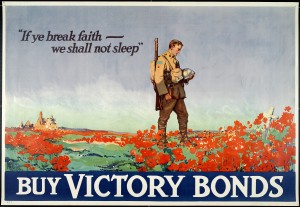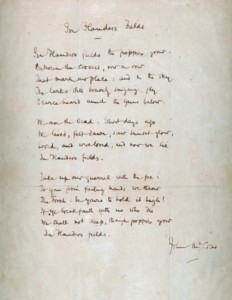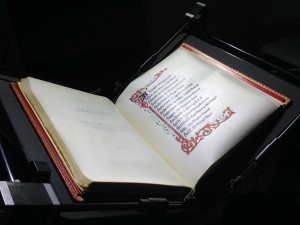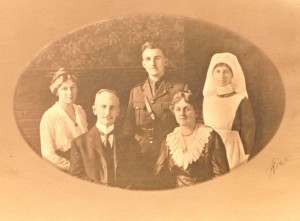Over the course of the 2014-15 academic year, McGill University Library & Archives has scheduled several special events and exhibits to commemorate the centenary of the First World War.
Special event
McGill’s illuminated Book of Remembrance digitized and on display
Tuesday, November 11, 2014 from 10am to 4pm
Humanities & Social Sciences Library, McLennan Library Building, main flr lobby, 3459 McTavish Street
Since World War I, McGill University recognizes the importance of honouring its faculty, staff and students who served, and especially those who lost their lives. The illuminated Book of Remembrance records the names of the nearly 700 students, staff and faculty who lost their lives in WWI and WWII. The Book, bound in red leather, features the name of each fallen soldier handwritten in calligraphy. The parchment pages are emblazened with vibrant reds, blues, greens, silver and gold.
Since 1950, the Book of Remembrance has been on display in Memorial Hall in a brass and marble display case and bordered by the names of the battles fought in both world wars. In 2014, the Book was removed from Memorial Hall and carefully restored, and is now available to everyone in the Rare Books and Special Collections, and Archives Reading Room. As a result of this project, a replica of the Book was made and will be housed in a special display case in the pedway connecting the McLennan and Redpath Library Buildings. On November 11, Remembrance Day Service attendees are invited to view the original book on temporary display. A digitized version of the newly restored Book of Remembrance will also be launched on the McGill Remembers website here.
Exhibit in collaboration with the Montreal Museum of Fine Arts

“If Ye Break Faith – We Shall Not Sleep” war poster by Frank Lucien Nicolet (1887-?). Rare Books and Special Collections, McGill Library.
The Patriotism of Death: Propaganda posters from WWI
November 11, 2014, to March 29, 2015
Montreal Museum of Fine Arts, Graphic Arts Centre, Jean-Noël Desmarais Pavilion – Level S2, 1380 Sherbrooke Street West
Opening on Remembrance Day of the hundredth anniversary of the War to End All Wars – in which 37 million were injured and 8.5 million lost their lives – this exhibition of war posters produced during World War I by Canada, France, Germany, England and the United States will be presented in connection with From Van Gogh to Kandinsky: Expressionism in Germany and France, 1900-1914. The twenty large sheets selected from the collections of McGill University Library and the Museum show the distinctive dramatic approaches and types of graphic media used by opposing national governments to encourage their citizens to enlist, raise funds and contribute to the war effort. Lest we forget…
For admission and opening hours information click here.
McGill News Alumni Magazine recently published a great overview of the collaboration featuring Hilliard Goldfarb, an associate chief curator at the MMFA and our very own head of Rare Books & Collections Richard Virr. To access this article, click here.
This summer, as part of their “The Great War” series, our war poster collection was also featured in The Gazette’s write-up on the conscription crisis. To access this article click here.
Access McGill’s Canadian War Poster Collection online here.
Exhibit

Handwritten copy of the poem In Flanders Fields by John McCrae dated 31 May 1916. Osler Library of the History of Medicine, McGill Library.
We will remember them: The No. 3 Canadian General Hospital (McGill) in The First World War, 1915-1919
February – June 15, 2015
Humanities & Social Sciences Library, McLennan Library Building, main flr lobby, 3459 McTavish Street
This exhibition celebrates the contribution of McGIll University to healing the broken bodies that were the casualties of the First World War. A handwritten copy of John McCrae’s poem In Flanders Fields is amongst the items on display.
When the First World War began, Dr. Herbert Stanley Birkett, Dean of McGill’s Faculty of Medicine, organized a general hospital to serve in France. The No. 3 Canadian General Hospital (McGill), was a 1040-bed unit located behind the front lines. The officers were made up of faculty members, who were assisted by medical students and other volunteers. The nurses were drawn from women trained at the Royal Victoria and Montreal General hospitals’ schools of nursing. Other universities in the empire, such as the University of Toronto, Queen’s and Laval, followed McGill’s lead and organised their own hospitals. The No. 3 C.G.H. left Canada in 1915 for England before establishing itself in Dannes-Camiers, France, in August 1915. From 1916-1919, the hospital was located in Boulogne, France. From 1915-1919, the hospital admitted 143,762 sick and wounded patients, and performed 11,395 operations.
Free. Accessible during opening hours.
Exhibit
The Lighthalls: A McGill Family at War
February – June 15, 2015
Humanities & Social Sciences Library, McLennan Library Building, 4th flr lobby, 3459 McTavish Street
The Lighthalls were a typical Montreal and McGill family whose members participated in the First World War in different ways. William D. Lighthall (B.A. 1879, B.C.L. 1881, L.L.D. 1921) was one of the founders of the Great War Veteran’s Association and was active in supporting the war effort in Montreal. His inaugural address as president of the Royal Society of Canada was on “Canadian Poets of the Great War” (1918). He was also a member of the Montreal Branch of the Armenian relief Fund Association of Canada. William S. Lighthall (Arts 1916, B.C.L. 1922) enlisted in September 1914 and later joined the Royal Flying Corps and served in Palestine and Mesopotamia. He was awarded a D.F.C in 1919. Alice Lighthall (B.A. 1913) joined the Volunteer Aid Detachment (V.A.D) and nursed at the No. 5 General Hospital in Rouen, 1916-1918 and her sister, Cybel (B.A. 1914), was a V.A.D. in Canada, 1916-1918. Finally, Mrs. Lighthall (Cybel Wilkes) was one of the early workers in developing and providing rehabilitation for wound soldiers.
The exhibition will use letters, photographs and diaries in the Lighthall Papers held in Rare Books and Special Collections and other contemporary documents.
Free. Accessible during opening hours.
















Leave a Reply
You must be logged in to post a comment.